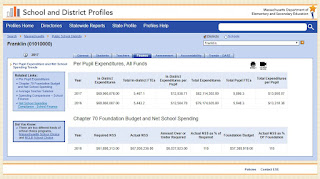This session shares my conversation with Superintendent Sara Ahern regarding the school fall re-opening status. Our conversation was conducted via conference bridge to adhere to the ‘social distancing’ requirements of this pandemic period.
Sara provides an overview on the task force and process to work on the preliminary plan. The preliminary plan is due to be submitted to the Department of Elementary and Secondary Education (DESE) by close of business on Friday, July 31. (It was submitted after we recorded this conversation with the preference to open with 'remote learning' in September).
The show notes contain links to the School Committee meeting agenda and reference documents as well as the audio from the meeting covering the preliminary plan and discussion.
Our conversation runs about 11 minutes, so let’s listen to my conversation with Sara on the preliminary plan and process.
Audio file = https://www.hipcast.com/podcast/H6nSl5dK
--------------
School Committee agenda
https://www.franklinmatters.org/2020/07/franklin-ma-school-committee-agenda_26.html
School Committee meeting packet
https://www.franklinps.net/district/school-committee/pages/july-28-2020-school-committee-meeting-packet
Franklin Public Schools - Re-opening page
https://www.franklinmatters.org/2020/07/franklin-public-schools-re-opening-plan.html
Re-opening Plan presentation doc
https://www.franklinps.net/sites/g/files/vyhlif4431/f/uploads/reopening_school_presentation_for_sc_7_28_2020_updated_with_new_info.pdf
My real time reporting via Twitter summarized
https://www.franklinmatters.org/2020/07/school-committee-recap-re-opening-fully.html
--------------
We are now producing this in collaboration with Franklin.TV and Franklin Public Radio (wfpr.fm) or 102.9 on the Franklin area radio dial.
This podcast is my public service effort for Franklin but we can't do it alone. We can always use your help.
How can you help?
- If you can use the information that you find here, please tell your friends and neighbors
- If you don't like something here, please let me know
Through this feedback loop we can continue to make improvements. I thank you for listening.
For additional information, please visit Franklinmatters.org/
If you have questions or comments you can reach me directly at shersteve @ gmail dot com
The music for the intro and exit was provided by Michael Clark and the group "East of Shirley". The piece is titled "Ernesto, manana" c. Michael Clark & Tintype Tunes, 2008 and used with their permission.
I hope you enjoy!
------------------
You can also subscribe and listen to Franklin Matters audio on iTunes or your favorite podcast app; search in "podcasts" for "Franklin Matters"
 |
| FM #321 FPS Superintendent Sara Ahern on Reopening Status - 7/31/20 (audio) |












